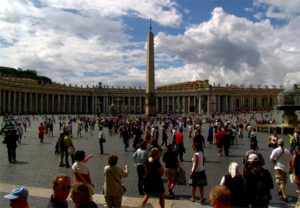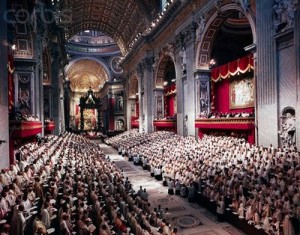
Councils, Synods, and Evangelization
My most simple or brief definition or explanation of the word is: the way we live our lives. Does our religion, if it is faith-based, as is true of Catholicism, really reflect the teaching or theology of Jesus? Fifty years ago, our Catholic Church in its Second Vatican Council did some soul-searching on this issue.
During the month of October, our Archbishop attended a Synod in Rome where a significant number of Bishops from around the world as well as other religious leaders concerned themselves with the issue of a New Evangelization. Once again, we have another big word. Evangelization simply means to proclaim as Catholics the Gospel as Jesus taught it to His followers as contained in the New Testament.
Catholic Culture and the Need for Scripture Study
It might be well for us to reflect on the culture of our Church in the United States as we come to live here from another culture. The culture of the United States without any consideration of religion and it practice is different, at times, from the cultures of Latin America, Asia, or Africa.
Latin American Catholicism generally focuses upon a devotional style of living our faith. While the heart of devotionalism comes from the feelings of the heart, and while such is basically good, it might end up having less meaning than a style of Christianity that focuses more on Sacred Scripture and its implementation in our lives.
For centuries until the invention of the printing press in 1453, the Bible was hardly understood by many in Christianity. With the advent of the printing press, the spoken Word and its implementation became more common than learning one’s faith from stained glass windows or other visual means of faith transmission. For example, the devotion known as the rosary goes back to St. Dominic who preached or evangelized around the year 1200 A.D. The rosary was and is a form of prayer that focuses on the central mysteries of Christianity. It was affected by the teachings of the Bible, especially the Book of Psalms. The new Catholic devotion known under the title of Divine Mercy is less than 50 years old.
The Second Vatican Council saw the need for the stressing the importance of the study of the Bible. Thus, the document entitled the Dogmatic Constitution on Divine Revelation – Dei Verbum.

Other Issues Addressed by the Council
The Council also concerned itself with the fearful defensive position of our Catholic Church as it came out of the 1950’s, some 300 years after the reformation envisioned by Luther and the other leading Protestants. Pope John Paul II took as his motto: “Be not afraid”. Jesus so often used those same words when He referred to a weakness of Faith among the People of Faith during His time. This teaching is called the Dogmatic Constitution on the Church – Lumen Gentium which means “Light of the World.” The positive aspect of the Church’s life was dealt with in the Decree on Ecumenism – Unitatis Redintegratio.
The liturgy or worship—the Mass and the Sacraments—were considered in the teaching on the Constitution of the Sacred Liturgy – Sacrosanctum Concilium. Until then, for most of its history, the Mass had been in Latin. Thus, we are able to understand better our celebration of Mass with its prayers and hymns.
The active involvement of the lay people was considered in the Decree on the Apostolate of the Laity – Apostolicam Actuositatem. The missionary activity which is the call of the Church to evangelize was expressed in a comprehensive manner as the meaning of the Baptism reminded all that they share in the priestly, prophetic, and kingly office of Christ and, therefore, all have a role to play in the mission of the Church. As such, the role of religion or Faith is that of women as well as men.
The consequence of the development of human knowledge or science was addressed in the Pastoral Constitution of the Church in the Modern World – Gaudium et Spes.
Living Faith in a World Devoid of It
In Christ and through Faith in Him, we live a New Life. It is a life whose purpose is to bring about a healthy world where God rules rather than sin. Thus, the fourth point of the Archbishop’s Pastoral Letter is to proclaim the Gospel of Life and promote a culture of life.
Today, we experience many of our younger Catholics looking upon our faith as irrelevant. They claim to see little point of practicing faith. Yet, they say they have a spirituality. They seem to be turned off, in many cases, by our devotional practices. They live a life devoid of any practical faith. We refer to it as a way of Secularity living. Yet, it is in connection with the Church or our worship service that we consider God’s Word and the mysteries of our faith. Yes, we have a Catholic identity as well as a cultural diversity. Our challenge as Catholics of this Archdiocese under the leadership of Archbishop Gomez is to live our Faith as we acknowledge our cultural diversity.